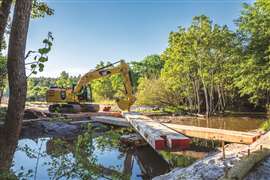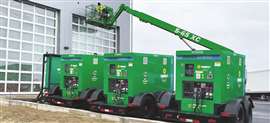Uncertainty over election, rates and inflation cloud future for US rental
05 August 2024
Speaking to exhibitors at the ARA Show in New Orleans in February, one got the sense that the equipment rental industry in the US has seen a relatively strong period in recent years, backed up by healthy demand from the construction sector and aided by increased infrastructure spend by government.
 Experts say if the Fed begins to reduce interest rates, the current growth cycle in the US could last for the next several years, through 2028.
Experts say if the Fed begins to reduce interest rates, the current growth cycle in the US could last for the next several years, through 2028.
An updated forecast released in May by the American Rental Association (ARA) suggested that the US could reach $79.2 billion in rental revenue this year, a 2.8% jump from previous estimations which predicted a total of $77.3 billion.
According to ARA VP Tom Doyle, the market could benefit from “tailwinds from interest rates, inflation, improving supply, a preference to rent, and government and private spending.”
That sentiment is backed up by Mike Disser with RMC Consults LLC, who tells IRN, “The US rental market is poised for steady growth this year.
If the Fed begins to reduce interest rates, he says, “This growth cycle could last for the next several years, through 2028. Infrastructure and mega project spending, mostly the result of federal legislation, will be a key driver of equipment demand.
“This includes the $1-trillion infrastructure legislation passed in 2021, with the bulk of the projects slated over the next four years.”
The big get bigger
Disser says the market is continuing to see a consolidation phase, with more focus on specialty and selective acquisitions.
That trend has grown in recent years, with REIC, United Rentals and Sunbelt Rentals among the companies making noteworthy moves.
In the case of United Rentals, the compant says its focus on specialty and the opportunities it has presented over the first quarter of 2024 is a key factor in its recent growth, with revenues for the first quarter reaching $3.4 billion.
In fact, revenues from its specialty business increased by 18% in 2022 (up to $3.2 billion) for the full 2023 financial year, which the company said was down to “strong demand across our end markets and increased average OEC.”
Adding to a number of specialty acquisitions in recent years, the company also acquired the Yak temporary matting business from its private equity owner for $1.1 billion back in March.
The deal included Yak Access, Yak Mat and New South Access & Environmental Solutions, which together rent a fleet of 600,000 wood and composite protection mats to customers in construction and utilities.
 United Rentals acquired the Yak temporary matting business from its private equity owner for $1.1 billion back in March.
United Rentals acquired the Yak temporary matting business from its private equity owner for $1.1 billion back in March.
That alone adds annual revenues of around $350 million while also reducing its reliance on traditional construction markets.
Matthew Flannery, chief executive officer of United Rentals, said, “We’re pleased with our start to 2024, which delivered first quarter records across revenue, adjusted EBITDA, and EPS. Our results are a testament to the team’s commitment to putting our customers at the center of everything we do and efficiently leveraging our competitive advantages.
“Our acquisition of Yak provides another excellent example of our strategy to grow our specialty rental business, differentiate our one-stop-shop capabilities and capitalize on both secular growth and cross-selling opportunities.”
Specialty growth
It’s a similar story for Ashtead Group, owner of Sunbelt Rentals. Its specialty businesses, which includes power & HVAC and flooring solutions, grew by 14% for the 2024 financial year.
Since its ‘Sunbelt 3.0’ plan in 2021, specialty has expanded at 25% CAGR, essentially doubling the business over three years.
Meanwhile, in its ‘Sunbelt 4.0’ plan, growth of specialty rental is among the primary objectives. This includes 12 distinct lines: power and HVAC at the top, with a plan for scale growth approaching $1.9 billion at the end of 4.0, all the way down to the newest line - temporary walls - with a plan reaching roughly $50 million in scale over the same period.
Kyle Horgan, SVP of business development, said, “If you sum all of these up, we have a plan that can add $2 billion over the 4.0 period, resulting in a specialty business that reaches $5 billion through the end of the period.
 Ashtead's specialty businesses, which include power & HVAC and flooring solutions, grew by 14% for the 2024 financial year.
Ashtead's specialty businesses, which include power & HVAC and flooring solutions, grew by 14% for the 2024 financial year.
“We know rental penetration in this space is still comparatively low versus the broader general tool and equipment landscape. We know the runway for growth in specialty is very long.
“We added three distinctly new lines over the 3.0 period: temporary structures, temporary fencing and temporary walls. All are essentially in their infancy, with lots of growth ahead. We know there’s opportunity for more.”
Part of the company’s plans to accelerate growth in specialty is to open between 300 and 400 greenfield depots, comprising between 180 and 240 specialty locations.
Meanwhile, ARA VP Josh Nickell says the growing number of companies making big investment in the specialty area can be linked to more opportunity for growth and a tightening of growth opportunities in general construction.
Rental penetration in the US is on the upswing, resting currently close to 60%. But where will it peak?
“We can’t get above 100%, so at some point we’re going to hit a wall of rental penetration that is going to take some of the jet fuel off of the fire and make things more complicated,” Nickell says.
“It sounds like we still have another five to 10 years before we get there, but it’s category dependent.”
However, Nickell tells IRN that it’s difficult for smaller rental companies in the US to make ground in the speciality field; “Specialty usually takes a different fleet, a different focus, and in many cases, even a different sales process.”
Election year
Of course, many companies in the rental sector will be keeping a keen eye on the outcome of the November election, which pits Vice President Kamala Harris against former President Donald Trump.
 Josh Nickell, ARA VP, says the result of the upcoming presidential election won't be as impactful as the uncertainty during the leadup, which tends to create volatile market conditions.
Josh Nickell, ARA VP, says the result of the upcoming presidential election won't be as impactful as the uncertainty during the leadup, which tends to create volatile market conditions.
As seen in the UK and France recently, an approaching election season always throws up uncertainty across various metrics, most notably for the economy.
However, according to Nickell, an election directly impacting the rental industry isn’t always the case.
“The general rule of thumb is that election years are tough, especially going into the election,” he says. “Uncertainty is not great for the construction industry for investment.
“That being said, and without getting highly politicized, it usually doesn’t matter what happens,” he says of the actual result of the election after emotions die down. “Things start to go back to normal.”
Instead, Nickell says high interest rates are an immediate concern among ARA members, particularly smaller companies with tighter CapEx budgets.
“One of the things that is really important for our smaller members are home renovations and around-the-house projects,” he says, noting those have stalled in recent years due to higher interest rates and because there was such a flood of that type of activity during Covid.
Lower interest rates could create a circular effect, prompting more people to move and/or renovate, which in turn could fuel more fleet investment among rental companies serving those customers.
“I think if we could see interest rates move back in the other direction, it will get some people to start that process,” he says.
To Disser, the biggest threat to US rental is inflation.
“One of the biggest obstacles that rental companies’ face has to do with achieving acceptable returns on their fleet,” he says. “With rapidly rising equipment, operational and employee costs, rental companies will be forced to raise rental rates to their customers and must be able to explain it to them in an acceptable manner, without losing them.”
He continues, “Inflation is the biggest concern. Costs are rising at a pace not seen previously, which are difficult to absorb and/or pass along to customers.”
Both Disser and Nickell agree that pricing discipline could steer the direction of the market.
“Rental companies who adopt disciplined pricing strategies will be in the best position to address any economic challenges they face,” Disser says. “It’s a battle each and every day to win customers – that never changes.”
STAY CONNECTED



Receive the information you need when you need it through our world-leading magazines, newsletters and daily briefings.
CONNECT WITH THE TEAM







